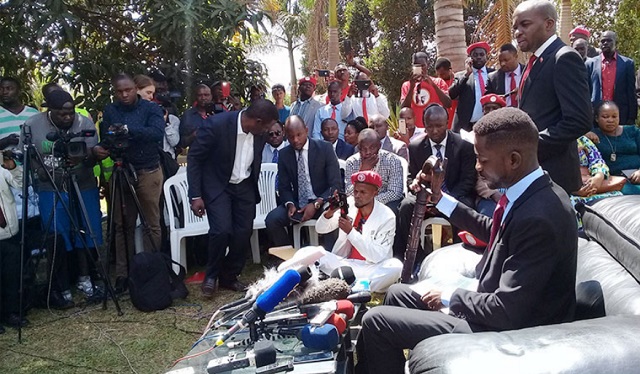
That’s stupidity, say Opposition but experts blame the law
Kampala, Uganda | RONALD MUSOKE | Opposition politicians and human rights activists are concerned about a recent directive by police to its district and division police commanders to ensure that all political meetings being held in private homes get dispersed. The activists want it challenged and opposition politicians are vowing to defy it.
Betty Aol Ocan, the Leader of Opposition in Parliament told The Independent that the opposition politicians find the police’s application of the public order management law frustrating. She says when legislators are making laws, the legislation is supposed to be ‘blind’ and it should apply to everyone but in Uganda, Police interpret this particular law depending on which political party someone belongs.
“The standards for people who belong to the ruling party, the NRM, are quite different from those who belong to the Opposition,” Ocan said, “We are working under difficult circumstances; you can call it a military dictatorship.”
Ocan said the Public Order Management Act says the people intending to hold public meetings should notify the police in good time and then it is up to the police to provide security or not.
“Now the police have turned this into (seeking) permission,” she told The Independent.
Muhammad Muwanga Kivumbi, the MP for Butambala County told The Independent on Jan. 13 that the power to assemble and associate is generally inherent and so police cannot say that private meetings are within the confines of the Public Order Management Act.
“Even if you are an enthusiastic and zealous police officer, your actions would be bordering on stupidity,” Kivumbi said, “That is the only way I can put it.”
Muwanga says laws have to be consistent with the Constitution which is the supreme law of the country.
Muwanga is an authority of sorts on this topic because, on May 27, 2008, the Constitutional Court made a landmark judgment in a case he filed. In the Muwanga Kivumbi v Attorney General, Muwanga went to the Constitutional Court seeking an interpretation of the law when he noticed police consistently used a provision in the Police Act to regulate political rallies or any form of assembly.
At the time, Section 32 of the Police Act required Ugandans to seek permission from the Inspector General of Police before exercising the right to demonstrate and assemble which was a contradiction of Article 29 of the Constitution.
Muwanga succeeded when the Constitutional court went ahead to declare section 32 of the Act unconstitutional. The court checked the powers that the police were legally using to disrupt and dispatch assemblies citing security reasons.
But a new law, the Public Order Management Act, 2013, was passed in Parliament and President Yoweri Museveni assented to it on Oct. 02, 2013. The Act, aims to provide for the regulation of public meetings and also provide for the duties and responsibilities of police, organizers and participants in relation to public meetings and to prescribe measures for safeguarding public order.
Opposition to defy
Based on this, Fred Enanga, the Police Spokesperson recently said police had “noticed a continuous violation of the Public Order Management Act (POMA) where politicians hold illegal political meetings in their homes or those of their allies.”
Speaking during the Police’s weekly interface with the media on Jan. 06, Enanga said meetings in private homes will not be allowed anymore since homes do not possess enough requirements to hold public gatherings and this according to police exposes participants to danger.
“Even if it is your private home, once it is a matter of public interest when you have the public gathering in your home, it has to meet the provisions of the Public Order Management Act,” he said.
Enanga said District Police Commanders will, going forward, ensure that any meeting involving more than three people is policed in accordance with the provisions of the Public Order Management Act, 2013, or else such gatherings should not be allowed to happen.
But human rights advocates and opposition politicians responded days later referring to the directive as an abuse of the Constitution and a violation of the Ugandans’ right to associate. They said the Constitutional Court already pronounced itself on the matter many years ago, noting that police have no authority to licence public gatherings but rather to provide security.
Some opposition politicians like Dr. Kizza Besigye and Erias Lukwago have vowed to defy the police directive citing Article 27 which prohibits unlawful search or entry into private premises.
“Notifying police about activities in a public space is a requirement (with the public order management law) and we have no objection and we shall do that,” Erias Lukwago, the Lord Mayor of Kampala said on Jan.08, “But in a private place or person’s home, we won’t.”
 The Independent Uganda: You get the Truth we Pay the Price
The Independent Uganda: You get the Truth we Pay the Price



